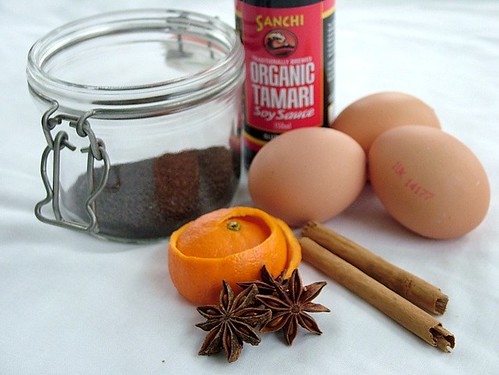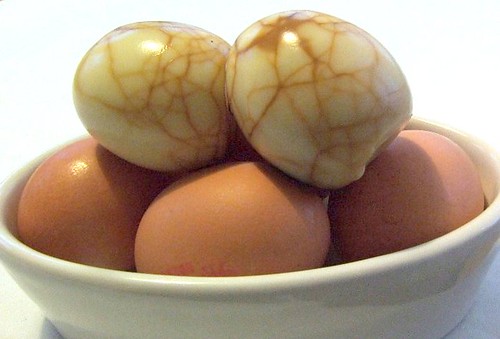Chinese food fascinates me but nothing caused me more confusion on initial discovery than this method of cooking eggs. The first Chinese recipe I book I owned was Marks & Spencer's book 'Chinese Cooking' by Deh-ta Hsiung and bought in 1981. I still have it and it brings back so many happy memories of my (retrospectively staid) introduction to this exotic and alien cuisine.
 Chinese takeaways didn't feature on my radar until my mid-teens. My introduction came instead from a wonderful family friend, Vera, who took my younger sister and I to Chinatown in London for the first time when I was about 12. I was hooked from the first moment, the smells, the hustle and bustle, and the ducks hanging in the windows of the restaurants as we strolled by.
Chinese takeaways didn't feature on my radar until my mid-teens. My introduction came instead from a wonderful family friend, Vera, who took my younger sister and I to Chinatown in London for the first time when I was about 12. I was hooked from the first moment, the smells, the hustle and bustle, and the ducks hanging in the windows of the restaurants as we strolled by. Vera took us to a restaurant on Shaftesbury Avenue where she was greeted as a long lost friend. It's only whilst typing this that I remember that she was brought up across the road in Soho, part of the close-knit Italian immigrant community who have introduced us Brits to the joys of Italian coffee as well as proper Spaghetti Bolognese and Parmesan cheese.
I can't remember the dishes we ate but I remember feeling elated as we strolled on down Shaftesbury Avenue, knowing that I would return as soon as I could.
 Page 66 of the afore mentioned book has a photo of braised eggs.
Page 66 of the afore mentioned book has a photo of braised eggs. When I first bought this book, I studied this photo for ages but couldn't grasp the perspective, so I couldn't work out what I was looking at. The eggs were braised out of their shell so the colour had evenly penetrated the smooth curved outside. Sliced in half, the yolks seem to sit proud of the egg as though they have expanded whilst cooking and popped out of the whites, and that is why the picture didn't make sense to me.Every time I see a recipe for tea or braised eggs, I think of this and giggle.
I had a few eggs which need to be cooked today and have been keen to try tea eggs, not the 1980s M&S version but instead a more traditional intricately patterned traditional version. I have used the recipe from Steamy Kitchen here. As I am only using 3 eggs in a little pan, I have roughly halved the quantities. If you are using a roomy pan, then be generous with your seasonings as the extra water will dilute the flavours.
The ingredients
3 eggs
1/2 tsp Szechuan pepper corns
1/2 stick cinnamon
2" piece mandarin orange peel
60ml (1/4 cup) tamari sauce
1/2 chicken stock cube (omit if desired)
1 star anise
1 tbsp black tea
1/2 tsp sugar
Boil the eggs in their shells for 3 minutes, remove and cool under running water, but retain the cooking water.
Add the rest of the seasonings to the pan.
Take each egg in turn and gently tap all over the shell with the back of a teaspoon. You are aiming to crack the shell all over . Do this gently as, especially if you are using old eggs, the shell can break and separate easily.
Return the cracked eggs to the pan and top up with water if necessary to ensure the eggs are covered.
Bring the pan to the boil then turn down to a low simmer and cover with a lid.
Leave the eggs to simmer for 40 mins before turning the heat off, leaving the eggs in the liquid.
Let the eggs rest for at least 5 hours - overnight is fine.
To serve, drain the eggs and remove the shell to reveal the interior.
I have looked forward to cooking these for so long, but wasn't great at tapping the shell delicately enough to create the pattern without doing too much damage.
I hadn't really thought about how these would taste. In fact, I have never given a thought to the taste - just the look, so I was really suprised to discover they are just lovely. So lovely, in fact, that I will be spending lots of time practising my shell-tapping techniques and enjoying the results. I wonder too, whether gently braised eggs (shelled rather than cracked) might be interesting inside a chinese spiced pork wrapped scotch egg ... or is that one step too far?!











Could you use the batter that is used for sweet & sour pork or prawns on an egg to create the Chinese version of a Scotch Egg. Then dipping into that sweet bright orange sauce could be just heaven. Have a go let me know!
ReplyDeleteBy the way - great photos!!
ReplyDeleteI was always curious to know how this eggs were made. Thanks for the recipe.
ReplyDeleteNever seen these before - they look really interesting and a great idea for party food. Is the aim to have fewer cracks on the shell or more? You say they taste really good, but what is the texture like - I sort of imagine them to be rather rubbery?
ReplyDeleteWould be a food to do for parties as it as the 'wow' factor :-)
ReplyDelete